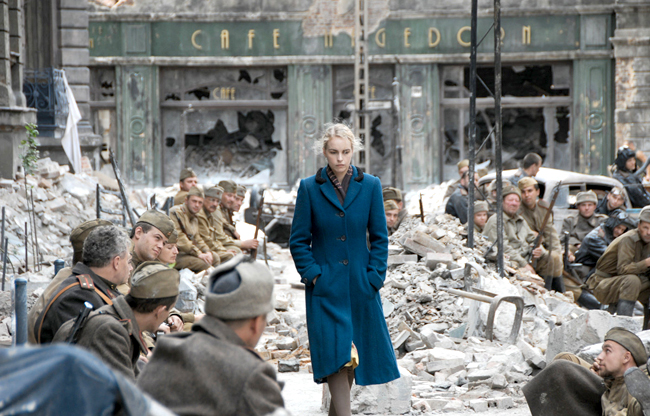|
Reviews of Recent Independent, Foreign, & Documentary Films in Theaters and DVD/Home Video

A WOMAN IN BERLIN Hundreds of thousands (some sources estimated over a million) German women were raped during the Red Army’s advance into the disintegrating Third Reich. (The Monument to Soviet Soldiers, erected by the Soviet Union in 1945 in the then-British sector of the former Nazi capital, is still mockingly referred to by locals as the “Monument to the Unknown Rapist.”) Left behind in the city as the able-bodied men (and boys) were sent off to the various fronts were mostly women, children, and the elderly. As the film begins, they aren’t demoralized, at least not politically, despite the relentless Allied bombing (over 90% of the city was destroyed). But director Max Färberböck doesn’t revise history, he dissects it. His title character never repents—she has willingly followed the Fuhrer to the abyss. She’s up-front in her voice-over that she chose to return to Berlin after working as a journalist in London and Paris. She goes by no given name; the film is based on the diary of Anonyma, published in the 1950s. According to the epilogue, her candid account of rape and postwar survival was initially harshly criticized in Germany, but became a bestseller after its 2003 reprinting. The violence in the film is not gratuitous; Färberböck is far more interested in his protagonist’s pragmatism than in shock value. Repeatedly raped, she decides she needs a protector—no lieutenant, no matter how handsome, will do—and strides through a crowd of leering Soviet soldiers to confront their commander, a major. Even though she has many advantages—she’s blond, beautiful, and speaks fluent Russian—he rejects her direct offer, at first. Under the major’s eventual protection, the main character and her neighbors live off of his largesse—sausage, horse meat, and plenty of schnapps. Färberböck encapsulates the waning days of the war within just a few city blocks, not far from the Reichstag, centered in a bombed-out building where the protagonist lives with a widow whose husband was once the pharmacist to Hindenburg. Unbeknownst to the Soviet occupiers, but known to everyone else, is that an armed German soldier hides in the apartment at the top of the stairs. Maybe it’s the passing of time or generations that has stirred up German interest in the World War II era, or a lessening of the country’s guilt of its Nazi past nearly 65 years after the war. Along with this film and Downfall, about the last days of Hitler, there was a highly rated 2006 television miniseries about the Allied firebombing of Dresden. Perhaps reexaminations are now less sensitive since the former Soviet Union and the Eastern Block dissolved a generation ago; most of the rape victims lived within the former Soviet-controlled eastern half. However, the subject matter is already highly charged without the fervid tone that often underlines the chaos: fast cuts, a camera constantly on the move, and a score that, no matter soft the piano chords, intrudes upon what could have been a more subtle scene. Färberböck often films star Nina Hoss from a lower angle, lending her a stature and sense of invincibility, not vulnerability. The subplots swirling around her have a melodramatic flavor—a severely jealous female Soviet officer and a defeated and aging German man looking on as his wife whores herself. Yet steely Hoss resists the histrionics. She portrays her Everywoman as an alert observer, who, as a defense mechanism, has emotionally removed herself from what is happening to her, until her relationship with the taciturn major changes into something she can’t (or won’t) describe. In what is the film’s only
obvious history lesson, her character translates to neighbors the
agonized account of a
drunken Soviet soldier describing the murder of children by German
soldiers serving the Fatherland. For her, it’s a shock as well as a confirming
realization for what’s to come. Then the most
effecting and chilling scene follows, where a woman cries out as she’s
being dragged away by Red Army soldiers, and Hoss considers the call to
action. The actress, one of Germany’s rising stars, delivers, here and
throughout, the complexity that the film, layered with tangled
relationships, seeks. Kent Turner
|

